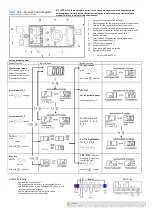
MiVoice Office 250 Installation and Administration Guide
520
•
Speed Dial Keys:
Each keymap can have up to 10 Speed Dial buttons. Each Speed Dial button
can be programmed by the phone user to dial one digit string. If assigned to a button with a
lamp, the lamp will show the status of an extension number if it is associated with that button.
•
Trunk Group Key:
These buttons are associated with specific trunk group access codes and
are used for placing outgoing calls on trunks in the selected trunk group. If assigned to a button
with a lamp, the lamp will be lit if all trunks in the trunk group are in use.
•
Undefined Key:
Any button can be left undefined if it will not be needed. It can be programmed,
like a user-programmable button, as described above. If the phone user or system administrator
returns the phone to default values, the button will return to being “undefined.”
Phones and Button Locations
The phones have additional buttons and lamps. For phone keymap assignments, refer to the “Phones
and Devices” chapter in the
MiVoice Office 250 Features and Programming Guide
.
Standard/Alternate Keymap Switching
In database programming, each phone is assigned a standard keymap and can also have an
alternate keymap. The user can switch between the keymaps by entering a feature code. The maps
can also be switched in the database using the Alternate Keymap phone flag.
For more information about keymaps, refer to the “Phones and Devices” chapter in the
MiVoice
Office 250 Features and Programming Guide
.
Having two keymaps provides the user with access to more features or trunks. In most situations,
the user would have one button programmed with the Switch Keymap feature code (399) in each
keymap so that it would be easy to change the keymap. If the user-programmed button has a lamp,
the lamp is lit when the alternate keymap is active.
When keymaps are switched, any user-programmable buttons in the maps retain their
user-programmed values; they are not returned to default during the switch. However, if the keymaps
do not have the same user-programmable buttons in the same positions, the location of individual
buttons may change when the keymaps change.
If a user switches keymaps during an outside call, the call will appear on the appropriate trunk or
CALL button for that keymap. The button assignment may not be the same for both keymaps. For
example, it could appear under a CALL button on one map and an individual trunk button on the other.
If a button is not available in the currently active keymap when a call rings in, the user will still see
the correct display, hear ringing, and can answer as usual.
To switch between keymaps when the phone is idle:
While on-hook, enter the Switch Keymap feature code (399). The display shows STANDARD
KEYMAP IS ACTIVE or ALTERNATE KEYMAP IS ACTIVE.
To switch between keymaps during a call:
While on a call, press the Special button, and then enter the Switch Keymap feature code (399).
The display momentarily shows STANDARD KEYMAP IS ACTIVE or ALTERNATE KEYMAP IS
ACTIVE.
Summary of Contents for MIVOICE OFFICE 250
Page 1: ...MiVoice Office 250 INSTALLATION AND ADMINISTRATION GUIDE RELEASE 6 3 SP3 ...
Page 24: ...MiVoice Office 250 Installation and Administration Guide xxiv ...
Page 29: ...Chapter 1 MiVoice Office 250 New Features ...
Page 54: ...MiVoice Office 250 Installation and Administration Guide 26 ...
Page 55: ...Chapter 2 Document Overview ...
Page 62: ...MiVoice Office 250 Installation and Administration Guide 34 ...
Page 63: ...Chapter 3 Product Description ...
Page 86: ...MiVoice Office 250 Installation and Administration Guide 58 ...
Page 87: ...Chapter 4 Specifications ...
Page 157: ...Chapter 5 Installation ...
Page 251: ...Installation 223 ...
Page 274: ...MiVoice Office 250 Installation and Administration Guide 246 4 Test for quality ...
Page 396: ...MiVoice Office 250 Installation and Administration Guide 368 ...
Page 397: ...Chapter 6 Reference ...
Page 416: ...MiVoice Office 250 Installation and Administration Guide 388 ...
Page 417: ...Appendix A Private Networking ...
Page 445: ...Appendix B Network IP Topology ...
Page 486: ...MiVoice Office 250 Installation and Administration Guide 458 ...
Page 487: ...Appendix C Open Source License Agreements ...
Page 506: ...MiVoice Office 250 Installation and Administration Guide 478 ...
Page 507: ...Appendix D Phones ...
















































